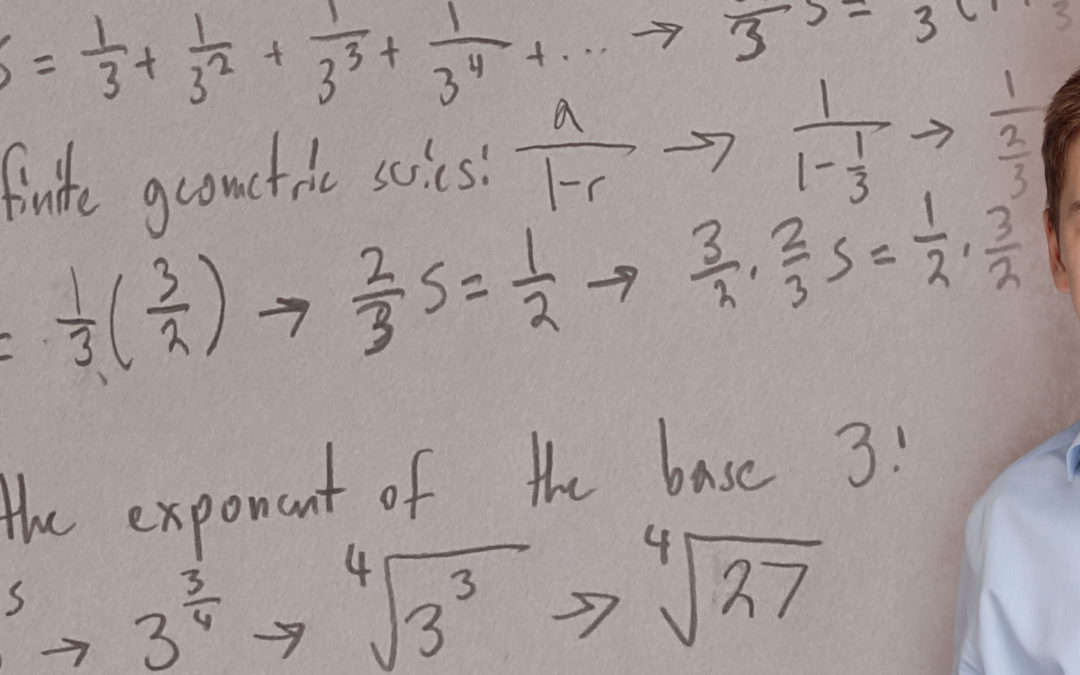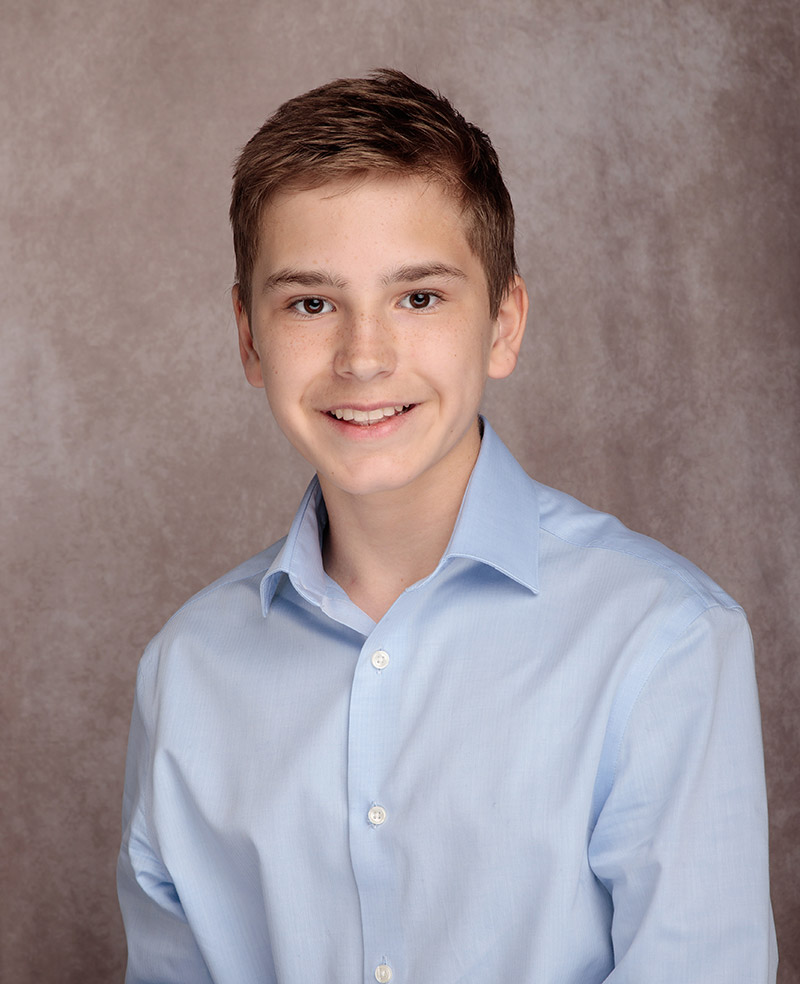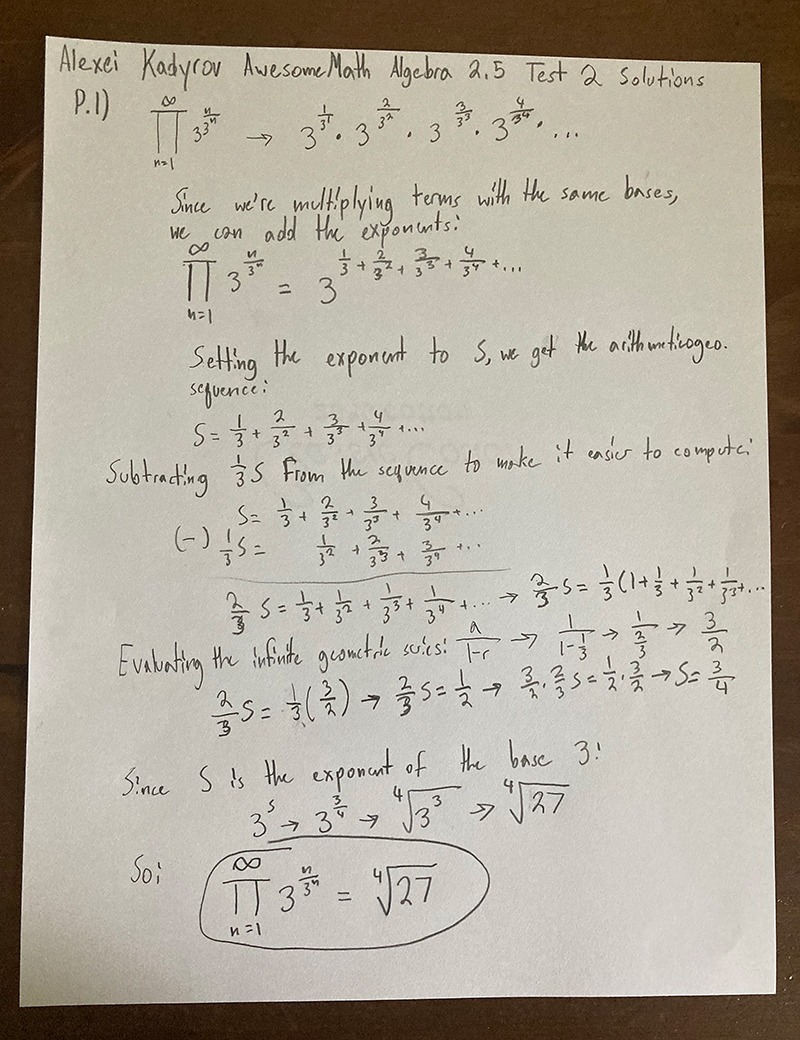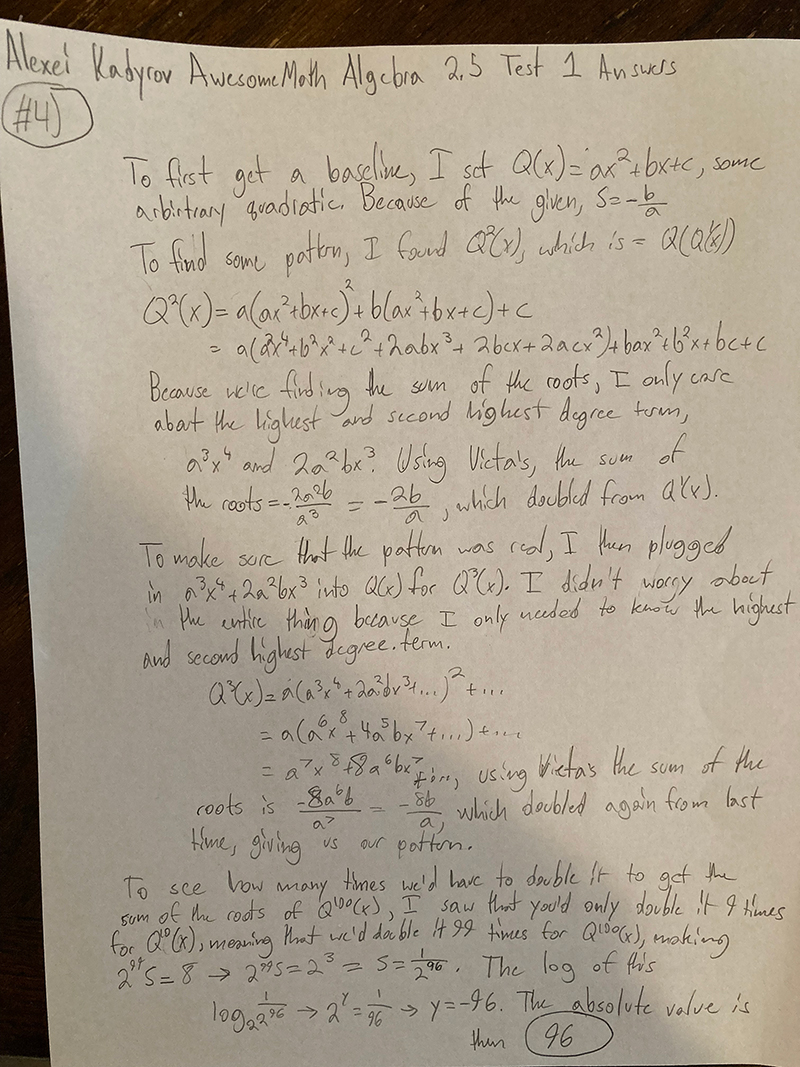Alexei Kadyrov talks about his online experience at Awesome Math where he has been studying Algebra 2.5. During the first week of his virtual course, Alexei attended lectures and problem sessions, followed by homework assignments, and a test.
“During the lecture we went over a bunch of stuff involving polynomials, including the identity theorem, the factor theorem, multiplicity, and polynomial rings. I have to be very fast while taking notes because the instructor moves quickly. Whenever I or someone else ask a question there is no judgment involved, no matter how bad the question. The problems in the problem session are challenging but not impossible, and I was able to contribute some ideas to the class. The homework was decently hard, but I was able to push through,” Alexei explains.
As the week progressed, Alexei lessons included Vieta’s Formulas, Newton’s sums, and equations. Alexei says the homework has become more difficult, and he has been hard at work solving the math problems.
“Wednesday was about equations and ways to simplify them down to equations that are algebraically possible to solve. Galois, a French genius, (who was in his teens when he found this) discovered the properties of equations that showed that any equation that had an x term x^5 or higher was impossible to solve. He also invented abstract algebra which is pretty cool. The homework was very difficult, and I somehow got a problem right that I was most definitely certain of it being incorrect,” Alexei says.
“We talked about Newton’s sums, which is the idea of how to find x^n + y^n + z^n for any n provided you know what x + y + z is and any other condition. This was exciting since I know that there are too many problems that I got wrong during math competitions for not knowing this. Despite understanding the class material, the homework used Newton’s sums weirdly, so I personally didn’t see how to solve one of the problems. After class however, I did go to SIU’s July 4th firework show, so technically a social event that I did outside of the summer class, even if I’m still at home,” Alexei adds.Alexei says his challenging week ended with two math assignments, followed by a day of rest from the program.
“Today we had our first of two math assessments. The idea behind these is to see how well you understood the previous week’s material and where you need to work more on. Surprisingly, the test was easier than I expected, and I solved 4/6 problems and made a lot of progress on a fifth, but wasn’t able to complete it,” Alexei says.
“The homework from Friday is still extremely hard, and I learned that I did pretty well on the test from Saturday. All but one of the problems that I attempted were correct, and I got a 62% on the test, which is, I’m pretty sure, above average. Overall, I really had fun this first week, and I’m looking forward to the next two,” Alexei exclaims!
Week Two — Hardest Week Yet!
During the second week, Alexei’s course covered trigonometry, followed by a lesson in complex numbers, the Roots of Unity, and summation. The homework assignments continue to be challenging.
“The first week left me feeling pretty good, I was understanding the topics covered and could complete the homework to a reasonable degree, so I was confident starting this one. However, this would be the hardest week yet. We covered trigonometry, something I already covered in school which also helped with my understanding of the content, but as would become a trend this week, the homework was horrible. The first problem, easy, the second problem, 6 hours of my life magically disappears with no progress to show for it. The solution turns out to be relatively simple, but only if you spot the first step. A wonderful start,” Alexei says.
“We covered graphing complex numbers, different properties of complex numbers and their conjugates, and so on. I made decent progress on the first problem, but made some sort of error in simplifying, and I made an algebraic error in the second problem. It was a very rough homework assignment,” Alexei adds.
“Building on yesterday’s subject, we covered the Roots of Unity. These are the complex roots to xn = 1, where 1 is a root, and then several complex numbers in the form e^(2πk/n) or r(cos (theta) + i * sin (theta)). As usual, I felt very confident about the lecture and content, and the homework was another story. The first problem, completely fine, great even. The second problem, I wrote it down wrong, so I spent 6 hours thinking about it, considering it, and wasting time trying to prove it. I only discovered that I had written it down wrong when the TA graded it, so that was fun,” Alexei explains.
“Today was summation, the idea of infinite sums and how to evaluate them. I found this pretty cool because somehow, having an infinite number of terms adding on to each other (or multiplying with each other) can have a finite solution. The lecture was great, but the homework was the worst yet. Even after getting hints from the TA who had assigned the homework, the problems were extremely difficult. I still don’t quite understand the solutions, hopefully ‘week 3 me’ will find out, but I did learn a useful trick on how to switch double summations, summation of all the terms of another summation, which can make problems easier to compute,” Alexei says.
The week ended with a lecture in multivariable factoring, more challenging homework assignments, and a test, where Alexei performed better than he expected.
“I think it is understandable that after the homework of the past week, much more difficult than the first week, I did not expect to do well on the test. But surprisingly, I did very well. During the first week’s test I got a 28/42, which was 2 points below average, which I lost for a very dumb reason. This week, I got a 33/42, 3 points above average for the class. So not only did I do well on a test during a very difficult week, I did better than the previous week where I felt as if I understood the material better,” Alexei says.
“Overall, this week was a lot harder than the first week. I learned a lot, and I did pretty well on this week’s test, exceeding my expectations of getting the average score. Hopefully, week 3 will both be easy to understand and I’ll be able to complete the homework without taking 6 hours,” Alexei adds.
Week Three — A Rewarding Experience!
As Alexei entered his final week of Awesome Math, the class learned about Arithmetic mean – Geometric mean inequalities, Cauchy-Schwartz inequality, rearrangement inequalities, finite differences, and recursive sequences.
“On Monday, we talked about Arithmetic mean – Geometric mean inequalities, where the arithmetic mean of a set of numbers will be greater than or equal to the geometric mean of those numbers. I learned this prior to this class, so the lecture and most of the homework was very easy to work through and understand,” Alexei says.”Tuesday’s subject was the Cauchy-Schwarz inequality. I did learn this concept earlier, but the proof based learning in this class especially helped me understand its purpose, which is to compare dot products of vectors, compared to when I learned it previously. It was a fun lecture, but the homework was a struggle. I was able to complete one of the problems, but the other one was extremely difficult. Even after a hint, I still couldn’t really understand it. Many people in the class struggled with it, so I’m going to try it later to understand,” Alexei reports.
“Still not quite able to understand yesterday’s problem, but today was yet another lecture on inequalities, the rearrangement inequality. Here, the idea is to maximize values, you pair the biggest values together, the smallest values together, and the mediumest values together. To minimize values, you pair the biggest value and smallest value, and the medium values with each other. There’s a lot of problems with this niche inequality to either simplify them or outright solve them without too much struggle. The hard part is noticing them and then effectively using them. The homework was really hard,” Alexei adds.
“Thursday’s topic was finite differences. This is a topic I actually understand pretty well and covered before, so I was very confident going into the homework. It’s the idea that if you have the solutions to a polynomial f(x0, with x being linear values like 1, 2, 3, etc, you can subtract those solutions from each other until you get 0, shaping a downwards facing pyramid. With some properties of finite differences, you can find the solution to the next value of x. This is really useful for a bunch of competition math, and I did pretty well on the homework because of it. There was one problem where it used terms I didn’t understand, but after seeing what those terms meant the problem became a lot easier. It was a pretty good day,” Alexei says.
“Friday was the final day of the class, and yet it was also the hardest. We talked about recursive sequences, which I understood the concept very well, but the problems afterward were a whole different beast. After seeing how my classmates solved those problems, the methods for solving recursive sequences became a lot clearer, but I was almost completely lost during the problem session. Thankfully, right after class things cleared up, and I understood how to get to a recursive sequence in a problem and solve from there, but it was a rough day,” Alexei explains.
“It was still fun though, even with the problem session being that difficult. I learned new things, and everyone in the class said goodbye, with a lot of funny comments while doing so. Thinking back, there were a lot of comedians in our class, which made the lectures a lot better than they would’ve been. As I said, it was a fun class,” Alexei adds.
Alexei says he received his course credit by the end of the week on Sunday, and officially finished the class. “It was a hard, but rewarding experience. I learned a lot about math that I wouldn’t have found on my own, and I learned many problem solving skills and tactics that will help me in the future,” Alexei says.
Great work, Alexei. We are so proud of you for taking on the challenges of the course and performing well!
>> Read Alexei Kadyrov’s final report (PDF File, 28 KB)
>> Learn about the other students’ experiences in the GFF Scholarship Program.




